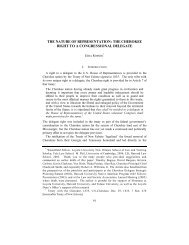Climbing Above the Culture Clash
Climbing Above the Culture Clash
Climbing Above the Culture Clash
Create successful ePaper yourself
Turn your PDF publications into a flip-book with our unique Google optimized e-Paper software.
for what you got back,” said Schell. “If<br />
you want to have a school <strong>the</strong> quality<br />
of BU Law — and that’s important to<br />
me — <strong>the</strong>n you need alumni and parents<br />
who are willing to contribute, not just<br />
financially but also with <strong>the</strong>ir time.”<br />
Throughout Schell’s long and successful<br />
career, he has continued to foster strong<br />
ties to his law school alma mater. As one<br />
of his many contributions, he serves as a<br />
member of <strong>the</strong> Dean’s Advisory Board, an<br />
activity he sees both as a way to give back<br />
to <strong>the</strong> school and to enrich his own life.<br />
“Being a lawyer is, among o<strong>the</strong>r things,<br />
about developing networks around <strong>the</strong><br />
country,” he said, noting that <strong>the</strong> board is<br />
made up of “highly successful, intelligent<br />
and diverse” graduates of <strong>the</strong> school.<br />
In addition to his board work, Schell<br />
has volunteered his time to help secure<br />
graduation speakers, meet with firstyear<br />
students to talk about his career,<br />
and even teach a class or two along <strong>the</strong><br />
way. He believes this type of personal<br />
participation is an excellent way for<br />
alumni to help <strong>the</strong> current generation of<br />
students find <strong>the</strong>ir niche in such a wideranging<br />
profession.<br />
“As you get older, you realize that things<br />
come to you by dint of hard work and<br />
talent, but also because o<strong>the</strong>r people<br />
have made sacrifices and contributions,”<br />
he said. “All of <strong>the</strong> selfless contributions<br />
from <strong>the</strong> alumni and board members are<br />
what make it possible for BU to continue<br />
as one of <strong>the</strong> top law schools nationally.<br />
If I can be useful by re-contributing some<br />
of <strong>the</strong> benefit that came my way, I believe<br />
that it is a good thing to do.”<br />
“The things that I have done through<br />
BU have been interesting, enjoyable<br />
and enriching,” he concluded. “I believe<br />
that participating in your school is a<br />
combination of obligation, interest and<br />
old-fashioned fun.” •<br />
Schell Cites BU Law as <strong>the</strong> Catalyst for His Career<br />
Michael Schell’s career trajectory since graduating from BU<br />
School of Law in 1976 has been a steady upward flight.<br />
Based on an internship following his first year, Schell landed<br />
a position in <strong>the</strong> corporate law department of Cadwalader,<br />
Wickersham & Taft for two years, moved on to <strong>the</strong> mergers<br />
and acquisitions department at Skadden Arps, and became a<br />
partner in 1984.<br />
“Coming out of BU, I found that I was well equipped wherever<br />
I went and whatever challenges I had to deal with as a young<br />
lawyer,” he said. “I had great teachers, particularly in my<br />
first year. Every teacher I had that year made an enormous<br />
intellectual impact on me. They showed me a new way to think<br />
about things and approach problems that I still use to this day.”<br />
After 19 years as a Wall Street lawyer, Schell decided to try his<br />
hand at investment banking, serving as vice chairman of Global<br />
Banking for Citigroup. Last year Alcoa, one of his long-term<br />
clients at Skadden Arps, persuaded him to come aboard to run<br />
<strong>the</strong> aluminum giant’s business development efforts.<br />
“My job is to survey industries worldwide to identify business<br />
opportunities for Alcoa,” said Schell. The scope of his search<br />
is enormous, since aluminum is used in a wide range of items,<br />
from commercial airplane wings and armored personnel<br />
carriers for <strong>the</strong> military to automobile engines and litho plates<br />
for printing newspapers and magazines — and of course, <strong>the</strong><br />
production of beverage cans.<br />
With <strong>the</strong> recent economic downturn, much of Schell’s efforts<br />
have focused on improving <strong>the</strong> efficiency and environmental<br />
sustainability of aluminum production. He noted that it takes a<br />
great deal of energy to extract aluminum from <strong>the</strong> ground and<br />
refine it into a useable form.<br />
“Because a large chunk of <strong>the</strong> industry is energy, we have<br />
to face up to <strong>the</strong> whole carbon footprint issue,” he said. “A<br />
large part of my business development efforts is looking for<br />
green energy opportunities. The cleanest source of energy is<br />
hydroelectric, and we have a number of smelters around <strong>the</strong><br />
world that run on hydro. The newest one is in Iceland. We are<br />
also investing in substantial hydro operations in Greenland,<br />
Brazil and Western China.”<br />
32 | Boston University School of Law | www.bu.edu/law









